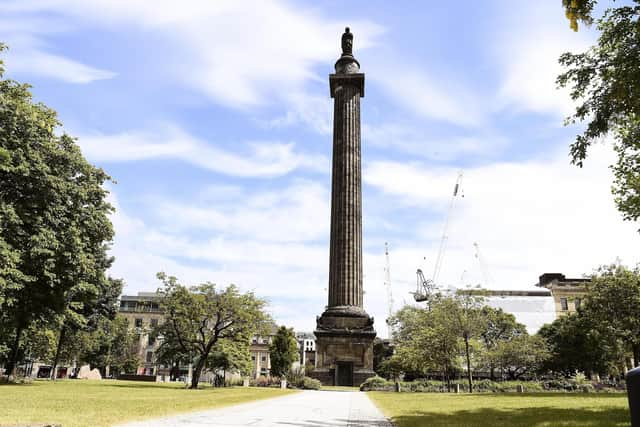'Shocking' removal of controversial plaque from Melville Monument about Henry Dundas' links to slavery reported to Police Scotland
Police Scotland have been contacted amid claims a “potential crime” has been committed around the removal of a controversial plaque from an Edinburgh statue.
The plaque accusing Henry Dundas of being "instrumental in deferring the abolition of the Atlantic slave trade” has been removed by an unknown member of the Melville Monument Committee.
Advertisement
Hide AdAdvertisement
Hide AdThe group includes Dundas descendants that has campaigned for its removal in the past arguing the A3 brass plate told a “grotesquely inaccurate version of history”.


The plaque, which was attached to the Melville Monument in St Andrew Square in 2021, came after a panel of city councillors and academics, including Professor Sir Geoff Palmer, reviewed Edinburgh's links with slavery in 2020.
The Melville Monument Committee (MMC) has since published a letter detailing reasons for the plaque’s removal, which is believed to have taken place on Monday.
Edinburgh City Council leader Cammy Day has described the actions as an “improper removal”.
And Claire Miller, the Scottish Green Party councillor for Edinburgh City Centre, said she had contacted Police Scotland about the incident.
She told The Herald: "I’m shocked to learn this relatively new and very important plaque, which gives the Melville monument its historical context and modern interpretation, is suddenly missing.
"I’ve reported this potential crime to the police, and to Essential Edinburgh who manage the gardens on behalf of the council, so they can investigate and hopefully return the plaque to its rightful place."
Viscount Bobby Melville, MMC founder and a Henry Dundas descendent, said: "The removal of the plaque is an historic development and momentous occasion in a five-year saga. The plaque represented a grotesquely inaccurate version of history that had no place on the monument or in a public square."
Advertisement
Hide AdAdvertisement
Hide AdMr Melville added: “Henry Dundas opposed slavery his entire life. When he developed a plan to abolish slavery and the slave trade together, hardline abolitionists refused to support him, but later regretted this.”
Cllr Day described the plaque’s removal as “disappointing”, adding a development management sub-committee meeting in March “did not give permission for the plaque to be removed”.
Cllr Day said: “We are investigating the improper removal of a plaque at the base of the Melville Monument in St Andrew Square. As caretakers to the statue, any works to the monument would require the council’s consent, which was not sought or given in this case.”
But the MCC say they have acted lawfully after receiving no objection from owners of St Andrew Square and claim the council had “no authority to install the plaque without consent of the owners in the first place”. Writing in a statement. they said: “It is the height of hypocrisy’ for the council to object to the plaque’s removal adding the MCC’s actions were ‘done in complete compliance with our legal obligations.”
Scottish historian, Professor Sir Tom Devine, who has criticised the wording of the plaque in the past, said the council “brought dishonour to Scotland’s capital city by installing a plaque at the foot of the Dundas Monument which was entirely flawed and inaccurate in terms of historical evidence.”
Sir Devine added: “The text which blamed Henry Dundas for alone postponing the end of the British slave trade in 1790s has been shown again to be entirely erroneous by further recent meticulous and forensic research. Throughout this saga not once did he, his predecessor or his colleagues consult any historian with expertise in the field to verify their claims about Dundas’s so-called historic crimes. They simply listened to activists with agendas.”
Sir Geoff, who led the review into Edinburgh’s links with the slave trade in 2020 and was a member of the committee that introduced the plaque, said he found the move by the MCC “astonishing” and labelled their actions a “very sad day for Scottish justice”.
He said: “I hope that the people who removed it will return it because this is a sad reflection on the will of the Scottish people in the sense that it was done by the council who is a representative government of the city of Edinburgh and somebody believes that they can defy that.
Advertisement
Hide AdAdvertisement
Hide Ad“This is now a legal matter between the council and the Melville Monument committee and I hope it can be resolved because that plaque is supposed to represent the suffering of people who were enslaved and their humanity taken from them – that’s what the plaque commemorates.”
Comments
Want to join the conversation? Please or to comment on this article.